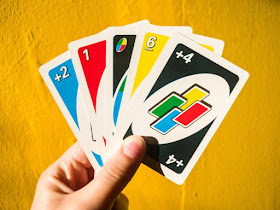We all have had students who have a difficult time with impulse control, planning ahead, time management, starting a task, completing a task, working memory, sustained attention, or organizing materials. These are all executive functioning skills. The frontal lobe of the brain is responsible for these. The frontal lobe doesn't fully develop until adulthood so we can't expect students to operate on the same level as adults. However, some students lag behind our expectations for their age group.
Students with ADHD often have a difficult time with at least one executive function skill.
Games are a great, fun, non-confrontational way for students to practice their executive functioning skills. In this post I am sharing fifteen games that help with the specific skill of task initiation/completion. These are for the student who is still on #3 when the rest of the class has finished #20 and is already sitting at the rug for story time. This is for the student who starts their project but can never seem to actually complete it. For the student who takes 15 minutes to get their pencil out.
 |
| Yup. |
Note: Games are not a magic wand nor are they the only way to develop executive function skills. We still need visuals, social stories, color-coded materials, and so on. This is just one piece of the executive function puzzle. We add it ALL up to get to success!
*Links are affiliate links. Full disclosure here.*
I have the original Bop It and just ordered the Bop It micro! The kids LOVE this game trying to get a new high score. I love it because it perks up my low-energy students and gets them engaged and working on making a decision---quickly!
Spoons is a game you can play with a deck of cards and actual spoons. There's a store-bought version of the game (that comes with little spoons) also available. Deal each player 4 cards. Have one fewer spoons than you have players. If you have 5 players, start with 4 spoons. First person takes a card off the deck, discards one of theirs to the left. That player discards a card to their left, and so on until it gets back to the dealer who then starts the process again. The goal is to get 4 cards of a kind and grab a spoon. Once the first person reaches for a spoon, everyone else quickly tries to grab a spoon. The player without a spoon is out and the next round begins.

This card game is easy for young students to learn and helps practice several executive functioning skills! Uno helps with planning ("The current color is green. Which card will I play when it is my turn?"), flexibility ("Oh no! I was going to play a yellow 3 but the number changed and now I need a blue or a 6!"), and task initiation ("It's my turn. I have to play a card!").
Playing Charades helps students plan and begin a task. They have to think about the picture/word to act out, plan how to act it out, and then actually act it out! Most of my students are beginning readers so I have the picture charades version where it has a picture for them to see instead of just a word.


Blurt is a quick game from Pathway To Success that you can play without having to purchase anything! It helps students think quickly and also control their impulses!
Pictionary is similar to charades. It works on planning ahead, thinking from another's perspective, and task initiation.


Simon Says requires students to think on their feet, pay close attention to detail, and yes, task initiation! If you don't do the movement, you're out!
5 Second Rule is for older students (the box says ages 10 and up). The timer component of the game makes it perfect for helping students practice task initiation--you have to give answers before time runs out! Pick a card and set the timer. You have 5 seconds to name 3 things from that category.


Have you played this? It's available as an app and a Facebook game. You make "recipes" by following the directions: crack eggs, mix, flip, and so on. There are different recipes to make and you're timed each step of the way. If you need an app to help a student practice task initiation, this would be a great one to try!
Cranium is perfect for high school students who need fun practice on executive function skills. The box suggests ages 16 and up. Teams compete in challenges that Hasbro explains as, "spelling a word backwards, drawing with their eyes closed, and solving a puzzle are just of few of the activities they might do."
Another great game for older students, Scattergories requires teams to compete to come up with things from a category that also start with the letter rolled on the alphabet die.
You'll need a set of ten frame cards for this one. TeachersPayTeachers has various free downloads available. Here's a free one I like from Primary Delight.
Deal cards evenly between two players and have each player stack theirs face down. Players turn over a card at the same time. Here's where you can have some variety:
- Greater Than (first person to say the number that's highest keeps both cards)
- Addition (first person to say the sum of the 2 cards keeps both)
- Multiplication (first person to say the product of the 2 cards keeps both)
Alternatively, play with all the cards in one stack. Turn one over:
- Name the Number (first person to say the number represented keeps the card)
- Plus 10 (first person to say the number plus 10 keeps the card. Ex: Ten frame card shows 2, student would need to say 12).
- Plus 100 (first person to say the number plus 100 keeps the card. Ex: Ten frame card shows 9, student would need to say 109).
Not only do these ten frame games help with number sense and fact fluency, but because there is a need to be FIRST, it prompts students to quick thinking.
Urgency is the name of the game in Hungry Hungry Hippos! The fast pace will spark students' need to start and complete a task (collecting the most marbles). Hungry Hungry Hippos is perfect for all ages but especially the younger ages because it is so simple and easy to learn!
Finally, Minute to Win it games are a fun way to practice task initiation when you are short on time! I plan on doing another post soon to give more ideas for this type of game. However, here's one to get you started:
You need 2 bowls, marshmallows, and a straw. Put one bowl of marshmallows in front of the student and an empty bowl next to it. Give the student a straw. They need to suck into the straw to pick up one marshmallow and dump it into the empty bowl. They have one minute to see how many marshmallows they can transfer over!
****************************************************
Games mentioned in this post:
* * * * * * * * * * *









































































